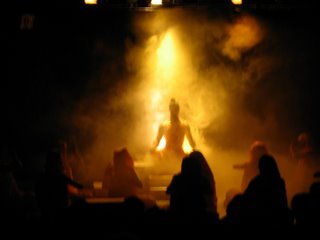 implementing these tricks to enhance the intellectual appeal of the play. Regardless, the dialogues are so cliché-ridden that barely a line impresses. And about melodrama, the only melodramatic scene is one necessitated by the story (in which Utpal’s children drown amidst colorful sheets), and not the narrator’s forced dramatizations. Plenty of yellow light and yellow robes remind one of the cinematic style only too common in the West whenever Buddhist themes come to mind (Kundun and The Little Budhha, for e.g.).
implementing these tricks to enhance the intellectual appeal of the play. Regardless, the dialogues are so cliché-ridden that barely a line impresses. And about melodrama, the only melodramatic scene is one necessitated by the story (in which Utpal’s children drown amidst colorful sheets), and not the narrator’s forced dramatizations. Plenty of yellow light and yellow robes remind one of the cinematic style only too common in the West whenever Buddhist themes come to mind (Kundun and The Little Budhha, for e.g.).The play starts with the narrator telling the audience, and he does a lot of telling throughout the play, about a despotic king whose repression has made many girls flee to become nuns. The girls finally find a bhikchu called Utpal, and the story digresses to recounting her woes and sorrows.
 The story of Utpal is an old Buddhist story about how she became a disciple of the Buddha. After committing some grave sin or the other (I think she kills an infant by inserting a needle in its head), she inflicts a curse upon herself that she will have to endure in the next life. After she is reincarnated, sufferings abound including the loss of husbands and children, having to eat her own child’s flesh, and being buried several times. Finally, she meets the Buddha himself, who silhouetted by dense smoke, imparts his wisdom, and Utpal becomes, I am guessing, enlightened. Again Mr. Abhi Subedi makes his sweeping attempt to tie it to modern politics. Of the girls who hear Utpal’s story, one of them decides that running away from an oppressive king and renouncing the world is not preferable to going back to society and changing it. How Utpal’s story relates to that I have no idea.
The story of Utpal is an old Buddhist story about how she became a disciple of the Buddha. After committing some grave sin or the other (I think she kills an infant by inserting a needle in its head), she inflicts a curse upon herself that she will have to endure in the next life. After she is reincarnated, sufferings abound including the loss of husbands and children, having to eat her own child’s flesh, and being buried several times. Finally, she meets the Buddha himself, who silhouetted by dense smoke, imparts his wisdom, and Utpal becomes, I am guessing, enlightened. Again Mr. Abhi Subedi makes his sweeping attempt to tie it to modern politics. Of the girls who hear Utpal’s story, one of them decides that running away from an oppressive king and renouncing the world is not preferable to going back to society and changing it. How Utpal’s story relates to that I have no idea.I cannot comprehend the praise the play is receiving in the Nepali media. Perhaps because it at least features a cruel king, no matter how far fetched his relation to the whole story is. Or perhaps all plays are novelties here.
4 comments:
>I cannot comprehend the praise the >play is receiving in the Nepali media.
A certain segment katmandu elites are keen to commercialize arts and literature as soon as possible,at any price. take Palpasa cafe for example. it's a terrible book but they pushed it as if Narayan Wagle was Ernest Hemingways's reincarnation. gave him Madan purushkar for it.
these guys and gals also know each other personally. I guess it makes it harder to criticize each other. maybe.
mero bchar ma, the reason many of them appreciated the play is because they've hardly seen plays. So, they get spellbound even with "jeevan dekhi jeevan samma". Aru chaina ta, bhaeko lai man parena bhanna sakdaina hami nepali.
i have not seen the play .
but i don't like the way daulat calls this 'jhaade'.
la yo play khatara chaina hola but i guess jhade nai pani ta chaina hola.
compare this with other nepali plays and make your judgement.
bideshi plays sanga compare garera ta kasari huncha ra.
by the way how many nepali plays have u watched and which is your best one.
'aawashyakta vanda badi charcha payeko pustak kun ho?'
'nepalma aawashyakta jati charcha ta kunai pustak le paudaina badi ko ta k kura'
--euta nepali writerle yo vanda malai thik lagya thyo
so if u guys think 'jeevan dekhi ..' and 'palpasa cafe' are getting publicity more than they deserve, the soultion is not to call them jhaade but to make more charcha of better deserving ones.
'yo vanda ta yo po ajja ramro ' po vanna saknu parcha..
kai navako bujruk nayanepal ma
Post a Comment